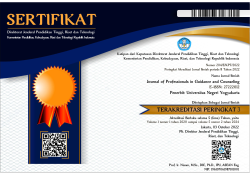Career guidance conceptualization to improve career adaptability for generation z
Downloads
Generation Z will control 20% of the workplace. Every generation has a different approach to work and the workplace. Z generation needs to have career adaptability to anticipate problems such as worries about not getting a job and a lack of understanding about the desired field of work. The research aims to explore and create a solid theoretical foundation for designing a career guidance model to increase the adaptability of Generation Z's career. The research uses library research methods sourced from books and literature on 1) career adaptability, 2) understanding generation Z, 3) counselling guidance models in the revolutionary era 4.0. The comparison between Generation Z characteristics and the dimensions of career adaptability, the primary need of Generation Z is career control. Career guidance services for Generation Z can be in the form of 1) coaching, 2) workshops, 3) inspirational content through social media, 4) internship programs.
Downloads
Alissa, S., & Akmal, S. Z. (2019). Career Decision Making Self-Efficacy Mediator Antara Dukungan Kontekstual dan Adaptabilitas Karier. Jurnal Psikologi Pendidikan & Konseling: Jurnal Kajian Psikologi Pendidikan Dan Bimbingan Konseling, 5(1).
Bascha.(2011). Z: The open source generation. Retrieved from http://opensource.com/business/11/9/z-open-source-generation
Berkup, S. B. (2014). Working with Generations X and Y in Generation Z Period: Management of Different Generations in Business Life. Mediterranean Journal of Social Sciences. doi:10.5901/mjss. 2014.v5n19p218
Brue Tulgan& Rain Maker Thinkign Inc. (2013). Meet Generation Z: The second generationwithin the giant "Millennial" cohort Rerieved from http://rainmakerthinking.com/assets/uploads/2013/10/Gen-Z Whitepaper.pdf.
Cai, Z., Guan, Y., Li, H., Shi, W., Guo, K., Liu, Y., & Hua, H. (2015). Self-esteem and proactive personality as predictors of future work self and career adaptability: An examination of mediating and moderating processes. Journal of Vocational Behavior, 86, 86–94.
Dan Schawbel. (2014). Gen Z Employees: The 5 Attributes You Need to Know. Retrieved from http://www.entrepreneur.com/article/236560
Dangmei, Jianguanglung & Singh, Amarendra. (2016). UNDERSTANDING THE GENERATION Z: THE FUTURE WORKFORCE. 3. 1-5.
Dwidienawati, D., & Gandasari, D. (2018). Understanding Indonesia's Generation Z. International Journalof Engineering Dan Technology, 7(3).
Douglass, R. P., & Duffy, R. D. (2015). Calling and career adaptability among undergraduate students. Journal of Vocational Behavior, 86, 58–65.
Ebenehi, A. S., Rashid, A. M., & Bakar, A. R. (2016). Predictors of career adaptability skill among higher education students in Nigeria. International Journal for Research in Vocational Education and Training (IJRVET), 3(3).
Faisal, M. (2017). Generasi Phi: Memahami milenial pengubah Indonesia. Republika.
Gaidhani, S., Arora, L., & Sharma, B. K. (2019). Understanding the attitude of generation Z towards workplace. International Journal of Management, Technology and Engineering, 9(1).
Hartono, R. M., & Gunawan, W. (2017). Hubungan Job Search Self-Efficacy dengan Career Adaptability. Jurnal Ilmiah Psikologi MIND SET, 8(02).
Hartung, P. J., & Cadaret, M. C. (2017). Career adaptability: Changing self and situation for satisfaction and success. In Psychology of Career Adaptability, Employability and Resilience. Springer, Cham.
Hirschi, A. (2009). Career adaptability development in adolescence: Multiple predictors and effect on sense of power and life satisfaction. Journal of Vocational Behavior, 74(2).
Joseph Coombs.(2013).Generation Z: Why HR Must Be Prepared for Its Arrival Retrieved from http://www.shrm.org/hrdisciplines/staffingmanagement/articles/pages/preparefor generation-z.aspx
Kirchmayer, Z., & FratriÄová, J. (2020). On the Verge of Generation Z: Career Expectations of Current University Students. Education Excellence and Innovation Management through Vision, 1575-1583.
Lent, R. W., & Brown, S. D. (2012). Career development and counseling: Putting theory and research to work (2nd ed.). John Willey & Sons.
Mardiyati, B. D., & Yuniawati, R. (2015). Perbedaan Adaptabilitas Karir Ditinjau dari Jenis Sekolah (SMA dan SMK). EMPATHY Jurnal Fakultas Psikologi, 3(1).
Ohme, M., & Zacher, H. (2015). Job performance ratings: The relative importance of mental ability, conscientiousness, and career adaptability. Journal of Vocational Behavior, 87, 161–170.
Ramdhani, R. N., & Kiswanto, A. (2020). Urgensi Adaptabilitas dan Resiliensi Karier pada Masa Pandemi. Indonesian Journal of Educational Counseling, 4(2).
Santilli, S., Marcionetti, J., Rochat, S., Rossier, J., & Nota, L. (2016). Career adaptability, hope, optimism, and life satisfaction in Italian and Swiss adolescents. Journal of Career Development, 44, 62–76.
Savickas, M. L., & Porfeli, E. J. . (2012). Career Adapt-Abilities Scale: Construction,reliability, and measurement equivalence across 13 countries. Journal of VocationalBehavior, 80(3).
Singh, A. P., & Dangmei, J. (2016). Understanding the generation Z: the future workforce. South-Asian. Journal of Multidisciplinary Studies, 3(3).
Sisca, S., & Gunawan, W. (2016). Gambaran adaptabilitas karier remaja. Jurnal Psikologi, 11(2).
Subhan, M., Hasgimianti, Hasgimianti, Sari, W. P., Bakar, A. Y. A., & Amat, S. (2019). Kematangan karir mahasiswa prodi ekonomi dalam pemilihan karir. Journal Educational Guidance and Counseling Development, 2(2).
Teresa Bridge. (2015). 5 Ways The workplace Needs To Change to Get The Most out Of Generation Z. Retrieved from http://www.fastcoexist.com/3049848/5-ways-the-workplaceneeds-to-change-to-get-the-most-out-of-generation-z
Ye, L. (2015). Work values and career adaptability of Chinese university students. Social Behavior and Personality, 43(3).
 | ProGCouns: Professional Guidance and Counseling Journal is licensed under a Creative Commons Attribution-ShareAlike 4.0 International License. |















